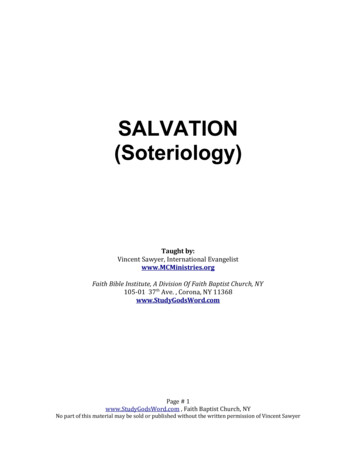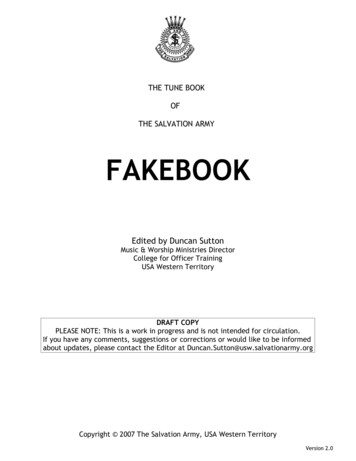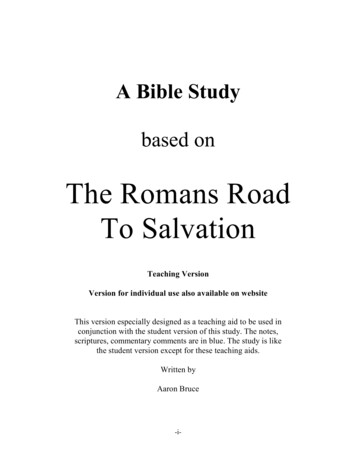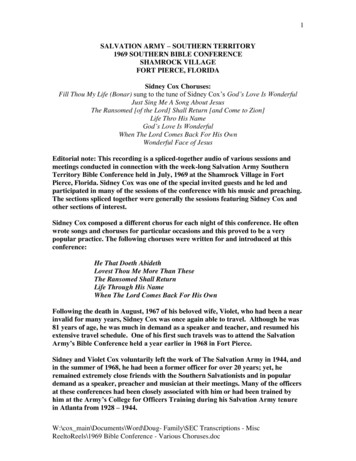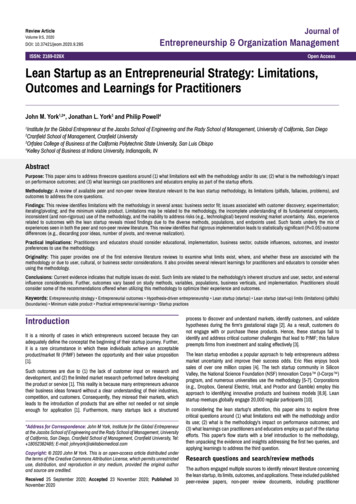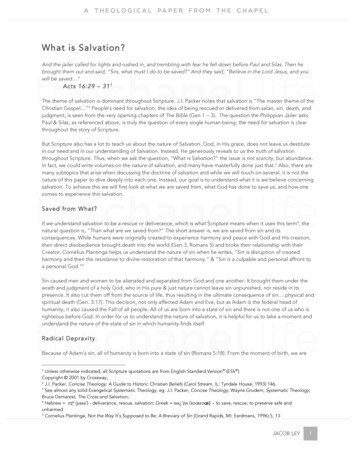
Transcription
What is Salvation?And the jailer called for lights and rushed in, and trembling with fear he fell down before Paul and Silas. Then hebrought them out and said, “Sirs, what must I do to be saved?” And they said, “Believe in the Lord Jesus, and youwill be saved ”Acts 16:29 – 31 1The theme of salvation is dominant throughout Scripture. J.I. Packer notes that salvation is “The master theme of theChristian Gospel ”2 People’s need for salvation, the idea of being rescued or delivered from satan, sin, death, andjudgment, is seen from the very opening chapters of The Bible (Gen 1 – 3). The question the Philippian Jailer asksPaul & Silas, as referenced above, is truly the question of every single human being; the need for salvation is clearthroughout the story of Scripture.But Scripture also has a lot to teach us about the nature of Salvation. God, in His grace, does not leave us destitutein our need and in our understanding of Salvation. Instead, He generously reveals to us the truth of salvationthroughout Scripture. Thus, when we ask the question, “What is Salvation?” the issue is not scarcity, but abundance.In fact, we could write volumes on the nature of salvation, and many have masterfully done just that.3 Also, there aremany subtopics that arise when discussing the doctrine of salvation and while we will touch on several, it is not thenature of this paper to dive deeply into each one. Instead, our goal is to understand what it is we believe concerningsalvation. To achieve this we will first look at what we are saved from, what God has done to save us, and how onecomes to experience this salvation.Saved from What?If we understand salvation to be a rescue or deliverance, which is what Scripture means when it uses this term4, thenatural question is, “Than what are we saved from?” The short answer is, we are saved from sin and itsconsequences. While humans were originally created to experience harmony and peace with God and His creation,their direct disobedience brought death into the world (Gen 3, Romans 5) and broke their relationship with theirCreator. Cornelius Plantinga helps us understand the nature of sin when he writes, “Sin is disruption of createdharmony and then the resistance to divine restoration of that harmony.” & “Sin is a culpable and personal affront toa personal God.”5Sin caused men and women to be alienated and separated from God and one another. It brought them under thewrath and judgment of a holy God, who in His pure & just nature cannot leave sin unpunished, nor reside in itspresence. It also cut them off from the source of life, thus resulting in the ultimate consequence of sin physical andspiritual death (Gen. 3:17). This decision, not only affected Adam and Eve, but as Adam is the federal head ofhumanity, it also caused the Fall of all people. All of us are born into a state of sin and there is not one of us who isrighteous before God. In order for us to understand the nature of salvation, it is helpful for us to take a moment andunderstand the nature of the state of sin in which humanity finds itself.Radical DepravityBecause of Adam’s sin, all of humanity is born into a state of sin (Romans 5:18). From the moment of birth, we areUnless otherwise indicated, all Scripture quotations are from English Standard Version (ESV )Copyright 2001 by Crossway,2J.I. Packer, Concise Theology: A Guide to Historic Christian Beliefs (Carol Stream, IL: Tyndale House, 1993) 146.3See almost any solid Evangelical Systematic Theology, eg. J.I. Packer, Concise Theology; Wayne Grudem, Systematic Theology;Bruce Demarest, The Cross and Salvation;4Hebrew שׁע ַ ( ֵ֫י yasa’) - deliverance, rescue, salvation; Greek sw¿ˆzw (soœzoœ) - to save, rescue; to preserve safe andunharmed5Cornelius Plantinga, Not the Way It’s Supposed to Be: A Breviary of Sin (Grand Rapids, MI: Eerdmans, 1996) 5, 131JACOB LEY1
not born as innocent creatures, but instead are born depraved.6 Lest we think that we are absolved of responsibility,we also perpetuate this state by our sinful acts. This state of sin and alienation from God, theologians have oftenreferred to as radical, or total, depravity. Radical depravity is not the idea that we are as bad or depraved as wecould be; that is, that humans always act in the worst possible way. But, it is the understanding that we, because ofour birth into a state of sin, are unable to do anything to save ourselves from the consequences of sin. Further, oursin blinds us and keeps us from even truly looking for salvation from God. Two passages help us to understand thisidea of radical depravity.For we have already charged that all, both Jews and Greeks, are under sin, as it is written: “None is righteous, no,not one; no one understands; no one seeks for God. All have turned aside; together they have become worthless;no one does good, not even one.”Romans 3:9 - 12Here Paul, in quoting from Psalm 14 & 53, helps us to understand that not one person is righteous before God; allare in a state of sin, and worse they are not even seeking God. Our state of sinfulness not only separates us fromGod, it keeps us from even seeking Him and the salvation he offers. Paul puts it like this in his letter to theEphesians.And you were dead in the trespasses and sins in which you once walked, following the course of this world,following the prince of the power of the air, the spirit that is now at work in the sons of disobedience— amongwhom we all once livedin the passions of our flesh, carrying out the desires of the body and the mind, and were by nature children ofwrath, like the rest of mankind.Ephesians 2:1 – 3Again, Paul gives us a description of the state of humanity prior to salvation. He describes us as dead and becauseof our deadness in sin we are children of wrath. God’s righteous judgment stands against us for our sin. Paul’sdescription of deadness is key here, as it helps us to see that in our state prior to salvation, there was not anyspiritual life or vitality in us. To describe someone as physically dead is to describe them without any life in them.Paul here is describing us as spiritually dead, acknowledging that sin has left us without any spiritual life and becausewe are dead we are completely unable to save ourselves.So this is what humankind is in need of saving from, sin and its consequences. Because of the disobedience of ourforefather Adam, and because of our own disobedience, we are in a state of sin. In this state of sin we stand asslaves to sin’s destruction of both God’s good creation and ourselves. We also stand in judgment and condemnationunder a holy God for our unholy sinfulness. Further, we are in a state of spiritual death, where by we are unable tosave ourselves or even seek after the salvation that God offers. It is only as we understand what we are being savedfrom, and the utter desperate state of sinfulness that we are in, that we are then able to appreciate that magnitudeof God’s act of salvation.Saved by GodHow then can people be saved? If we are unable to achieve any form of salvation for ourselves, and we aren’t evenlooking for the salvation God offers, how can anyone be rescued from this state of sin? The good news is thatsalvation is not a human concept, but it originates as a gift from God himself. The apostle Paul explains it this way But God, being rich in mercy, because of the great love with which he loved us, even when we were dead in our6This is commonly referred to as the Doctrine of Original SinJACOB LEY2
trespasses, made us alive together with Christ—by grace you have been saved— and raised us up with him andseated us with him in the heavenly places in Christ Jesus, so that in the coming ages he might show theimmeasurable riches of his grace in kindness toward us in Christ Jesus. For by grace you have been saved throughfaith. And this is not your own doing; it is the gift of God, not a result of works, so that no one may boast.Ephesians 2:4 – 9Our Reformation forefathers, based on this passage and others, unequivocally proclaimed that salvation is by gracealone through faith alone in Christ alone. It is, as we understand these truths that we see how great a salvation Godhas accomplished for us.By Grace AloneIn Ephesians 2, Paul makes clear for us that salvation is a gift of God’s grace. Salvation originates with God; He is thesource and accomplisher of it (Heb 5:9, Titus 3:5, Jonah 2:9, Romans 8:28-30). When it comes to our salvation asChrist followers, we understand that we do not contribute anything to our salvation, but that God, through Hisabundant grace, saves us. He gifts salvation to us, and not only does He gift us salvation, He also gifts us everythingnecessary for our salvation (Romans 8:28 – 30). Some argue against this understanding. They contend that peoplecontribute something to their salvation, even if it is merely faith. But, as one understands the Biblical teaching of thedepravity of humanity we see that people are completely unable to even obtain the faith necessary for salvationbecause of their sinful state. The idea that humans partner with God in their salvation is historically known assynergism, ‘Syn’ – meaning together and ‘ergon’ meaning work. Thus, humans and God work together in theirsalvation. This stands opposite of monergism, ‘mono’ meaning alone, which is the understanding that God worksalone in the accomplishment of salvation. Scripture affirms over and over again that Salvation is an act of God’sgrace, and it is a work that He does for His people by both electing and saving them (Ephesians 1:4 – 5, Romans9:16, Romans 8:28 – 30). Even the above Ephesians passage makes this evident as the phrase “And this is not yourown” refers back to both faith and salvation in its entirety. Therefore, to understand that salvation is by Grace aloneis to understand that Salvation is monergystic. God has saved us by His grace and we have done nothing to warrantnor to aid in this work of salvation. It is merely a gift of love from Him to His people.In Christ Alone 7God then by His grace alone accomplishes our salvation through His Son Jesus alone. We are saved through thedeath and resurrection of Jesus Christ.Now I would remind you, brothers, of the gospel I preached to you, which you received, in which you stand, and bywhich you are being saved, if you hold fast to the word I preached to you—unless you believed in vain. For Idelivered to you as of first importance what I also received: that Christ died for our sins in accordance with theScriptures, that he was buried, that he was raised on the third day in accordance with the Scriptures 1 Corinthians 15:1 - 3Paul again makes it clear that we are saved through the life, death, and resurrection of Jesus Christ. This is why themantra of Protestantism is that we are saved In Christ Alone. But how does Christ save us? Not through worldlypower or wisdom, but through his perfect life, his death on the cross, and His resurrection from the grave. TheScriptures uses many different images and ideas to help us understand Christ’s saving work on our behalf. For thesake of this paper, we will look briefly at several key ideas.Substitutionary AtonementAs we stated previously, our sin brought with it the just judgment and wrath of God. God cannot leave sin and7JACOB LEY3
disobedience unpunished or He would not be supremely just. Thus, we stood condemned for our sin. But Jesustook the punishment and the wrath of God for our sin and in doing so atoned (that is, made amends) for our sin. Hewas our substitute and received our punishment so that God would be both just and justifier (Romans 3:26) and wewould be free from the penalty of sin and stand justified before God. Further, Christ gifted us His righteousness sothat we are not seen in our sin, but in His perfect righteousness. Scripture uses the terms propitiation and expiationto describe this salvific act where by in propitiation Jesus appeases God’s wrath, and in expiation He removes theguilt of our sin, all through His death. The believer, by Christ’s atonement, stands justified and righteous before aHoly God. Several Passages affirm these truths of Christ’s substitutionary atonement He made Him who knew no sin to be sin on our behalf, so that we might become the righteousness of God in Him.2 Corinthians 5:21And He Himself bore our sins in His body on the cross, so that we might die to sin and live to righteousness; for byHis wounds you were healed.1 Peter 2:24And if anyone sins, we have an Advocate with the Father, Jesus Christ the righteous; and He Himself is thepropitiation for our sins 1 John 2:1 – 2For Christ also died for sins once for all, the just for the unjust, so that He might bring us to God, having been put todeath in the flesh, but made alive in the spirit.1 Peter 3:18But God demonstrates His own love toward us, in that while we were yet sinners, Christ died for us. Much morethen, having now been justified by His blood, we shall be saved from the wrath of God through Him. For if while wewere enemies wewere reconciled to God through the death of His Son, much more, having been reconciled, we shall be saved by Hislife.Romans 5:8-10RedemptionChrist not only atones for the penalty of our sin, He also redeems us from sin and its consequences, especiallydeath. By redeeming us, Christ has paid our ransom and rescued us not only from the curse of sin, but also thepower of sin in our lives, and accomplished for us our future resurrection and glorification. As a liberator redeems aslave from a slave-owner, so Christ has redeemed us from our slavery to sin and its consequences.And not through the blood of goats and calves, but through His own blood, He entered the holy place once for all,having obtained eternal redemption.Hebrews 9:12For even the Son of Man did not come to be served, but to serve, and to give His life a ransom for many.Mark 10:45For the wages of sin is death, but the free gift of God is eternal life in Christ Jesus our Lord.Romans 6:23In Him we have re
2 J.I. Packer, Concise Theology: A Guide to Historic Christian Beliefs (Carol Stream, IL: Tyndale House, 1993) 146. 3 See almost any solid Evangelical Systematic Theology, eg. J.I. Packer, Concise Theology; Wayne Grudem, Systematic Theology; Bruce Demarest, The Cross and Salvation; 4 Hebrew עַשֵׁ֫י (yasa’) - deliverance, rescue, salvation; Greek sw¿ˆzw (soœzoœ) - to save .
